Key takeaways:
- Hospital ministry offers vital emotional and spiritual support to patients, families, and healthcare staff, emphasizing the importance of empathy and active listening.
- First responders face significant emotional challenges, requiring recognition and support to foster resilience and address their mental health needs.
- Peer support initiatives and mindfulness practices are effective strategies in providing emotional support, helping first responders cope with the burdens of their roles.
- Building community connections through social events and shared experiences strengthens relationships among first responders, enhancing teamwork and collective resilience.

Understanding Hospital Ministry
Hospital ministry plays a vital role in providing emotional and spiritual support to patients, families, and healthcare staff. I remember my first experience in a hospital setting, where I witnessed the incredible weight of uncertainty on the faces of loved ones waiting for news about their family members. It struck me then how much it mattered to simply be present, to offer a comforting presence during such trying times.
Engaging with first responders within the hospital environment adds another layer to this ministry. There’s something so profound about recognizing the silent burdens they carry. Have you ever thought about the emotional toll these heroes endure? In my observations, a simple conversation or a moment of prayer can be transformative, allowing them a space to reflect and recharge amidst the chaos.
Moreover, the essence of hospital ministry is grounded in empathy and active listening. I recall an instance where a nurse expressed her own fears about the challenges she faced daily. Listening to her, I realized that being a support system also means creating a safe space for them to share their vulnerabilities. It’s in these moments that we can offer genuine support and help heal the broader community, one heart at a time.
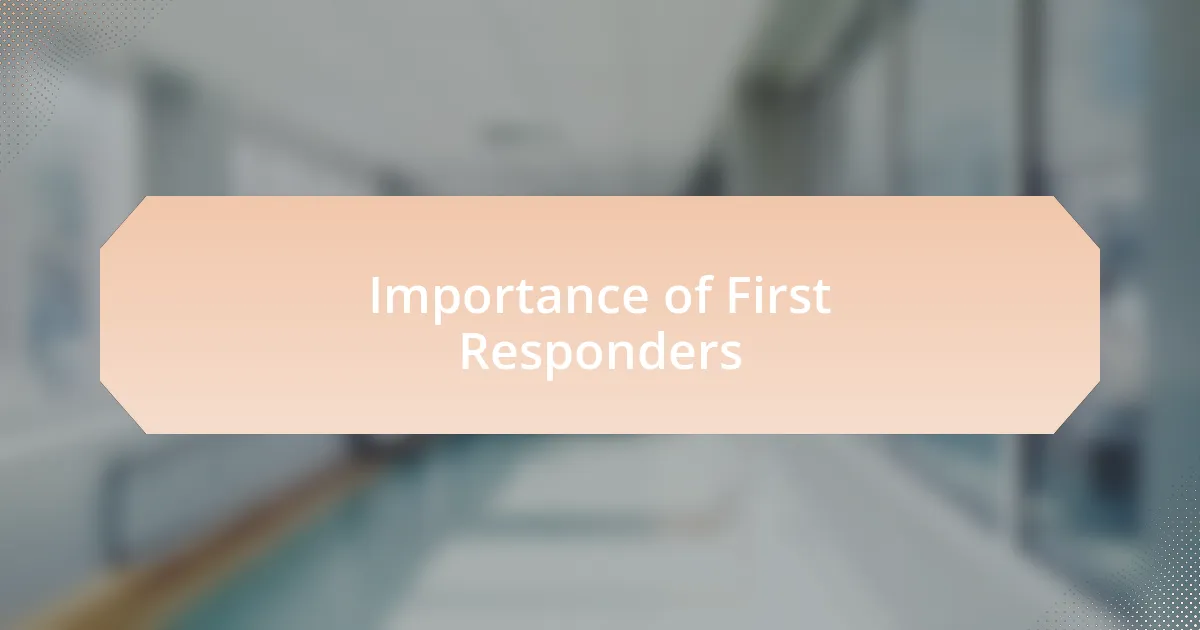
Importance of First Responders
First responders are the backbone of emergency care, often facing life-and-death situations every day. I still recall the day I met a paramedic who shared how he felt when he couldn’t save a patient. The weight of that experience lingered in his eyes, illuminating the invisible scars they often carry. What does it take to step back into such chaos after traumatic experiences? From my perspective, it takes incredible strength and resilience.
These professionals are not just responders; they are a lifeline for communities during critical times. I once participated in a debriefing session where responders talked about the emotional challenges they face, and it struck me how deeply their work impacts their mental health. Have you ever considered how they selflessly put others’ needs above their own? Their commitment deserves not only our recognition but our unwavering support as they navigate the unique challenges of their roles.
Furthermore, the importance of first responders extends beyond the emergency scene; they play a crucial role within the hospital system itself. I remember chatting with a firefighter who came to visit a colleague in the hospital after a tough call. His willingness to share his own struggles helped bridge connections with medical staff. In those moments, I realized how essential it is to nurture these relationships, as they enhance teamwork and foster a supportive environment for all involved in patient care.
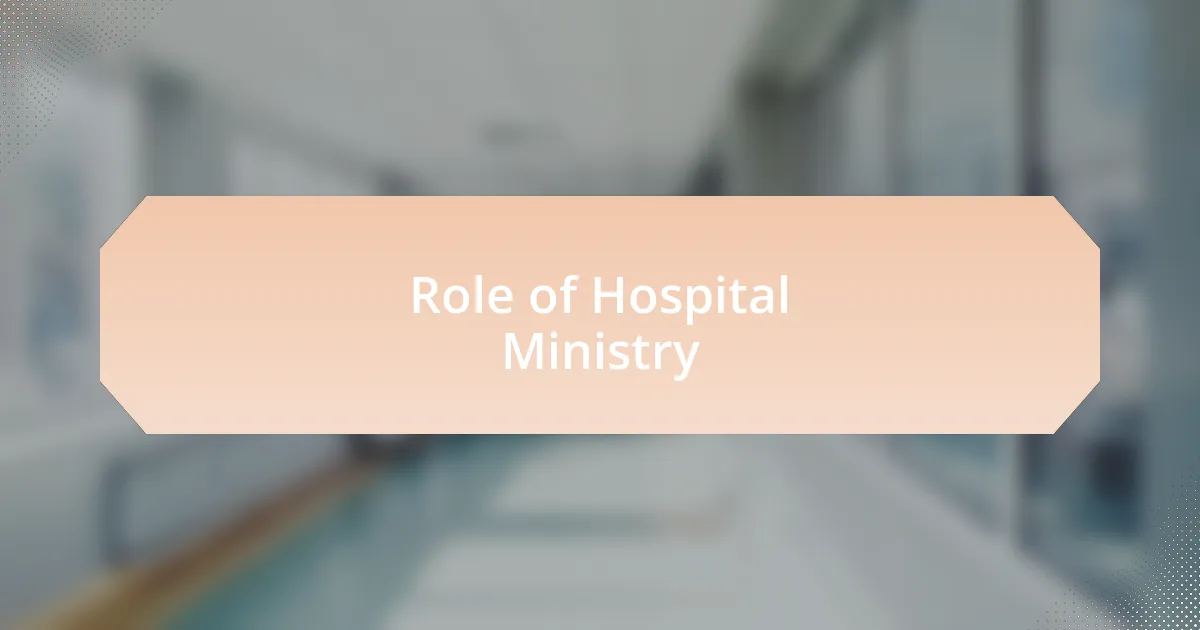
Role of Hospital Ministry
Hospital ministry serves as a vital conduit for spiritual and emotional support within the healthcare environment. I remember witnessing a hospital chaplain’s comforting presence when a first responder faced a tough moment—waiting to hear news about a critically injured colleague. The chaplain’s calming words and genuine empathy provided solace, highlighting the essential role of ministry in bridging not just the spiritual needs of patients, but also those of the caregivers who often find themselves under immense pressure.
In my experience, the role of hospital ministry extends beyond immediate emotional support; it fosters resilience in those who serve on the front lines. I once spoke with a nurse who shared how the ministry team helped her process the trauma of a particularly harrowing shift. She expressed gratitude for the safe space to reflect, allowing her to continue giving her best. Isn’t it astonishing how these support systems can enhance strength and renewal in healthcare professionals?
Moreover, hospital ministry acts as a unifying force, facilitating communication between first responders, medical staff, and patients’ families. I witnessed this firsthand during a community event organized by the hospital. The shared stories of triumph and struggle brought everyone together, breaking down barriers and enhancing mutual understanding. Does it not resonate with you that such initiatives can mend the emotional fractures that arise in times of crisis?
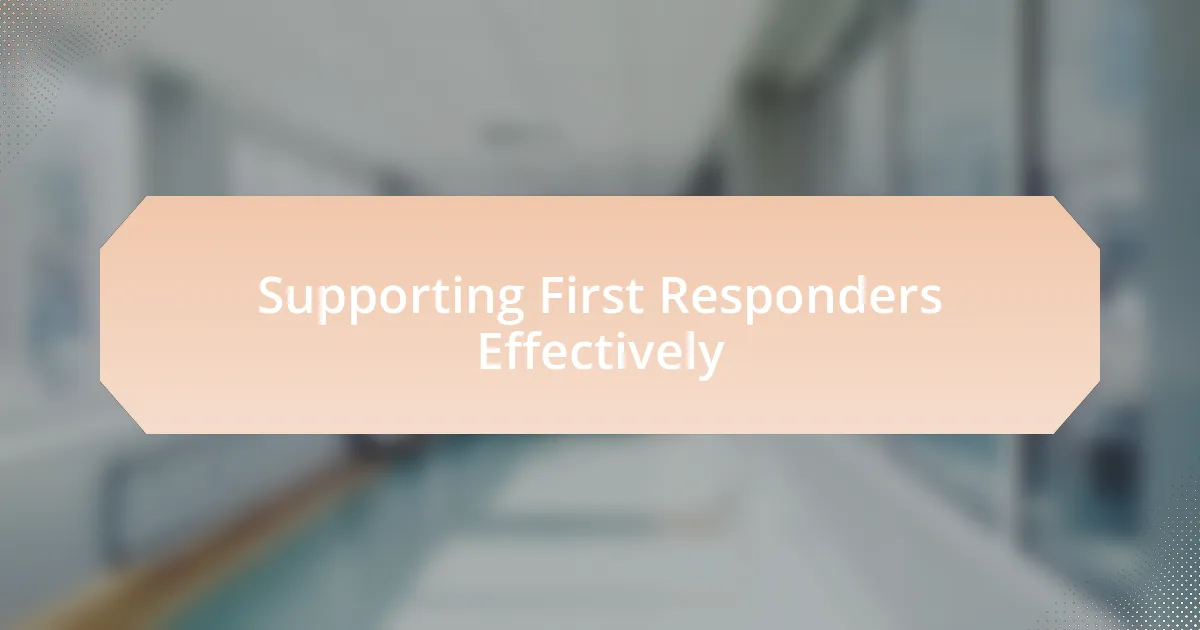
Supporting First Responders Effectively
Supporting first responders effectively requires an understanding of their unique challenges and emotional burdens. I recall a time during a debriefing session where a firefighter opened up about the weight of witnessing loss regularly. It struck me how vital it was to create a safe environment where they could express their feelings without judgment. Have you ever considered how simple listening can be a transformative support mechanism?
In my interactions with first responders, I’ve discovered that peer support initiatives can be incredibly powerful. I once attended a workshop led by seasoned paramedics who shared their coping strategies. The openness of these discussions helped others realize they are not alone in their struggles. Isn’t it remarkable how sharing experiences can foster bonds and enhance mutual support among those who face similar hardships?
Furthermore, I believe that incorporating mindfulness practices within hospitals can greatly benefit first responders. After participating in a guided meditation session, one EMT mentioned how it gave her a moment of peace amidst the chaos of her job. It made me wonder, how often do we tend to the emotional well-being of those who serve so selflessly? Offering tools for self-care can help them recharge and better serve their communities.
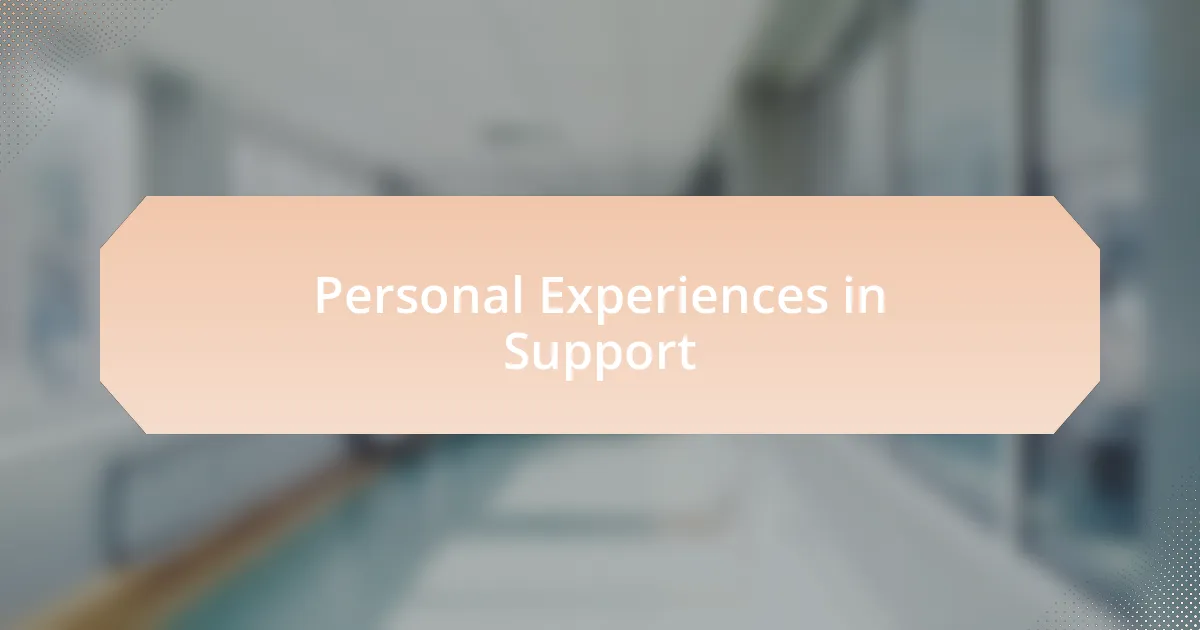
Personal Experiences in Support
One evening, while volunteering at a local station, I had the chance to talk to a seasoned police officer. He spoke candidly about the toll of late-night calls and the struggle to shake off those haunting images before heading home. It made me realize how important it is to create opportunities for these conversations—they need to feel heard, especially when the world around them often demands silence.
During another visit, I witnessed a small gathering where first responders shared stories over a warm meal. One young firefighter, in particular, opened up about the feelings of helplessness he felt after a particularly tough rescue. Watching the support pour in from his colleagues—hugs, nods of understanding—was heartwarming. It drove home the point that sometimes, just being present and affirming someone’s feelings can provide immense relief.
I also vividly remember a moment when an ER nurse shared her routine of journaling after shifts to process her emotions. Her expression of vulnerability encouraged others to prioritize their mental health. Isn’t it fascinating how fostering a simple act like writing can serve as a vital outlet for processing grief and stress? It left me wondering how many more support avenues we could explore to strengthen the resilience of those on the front lines.
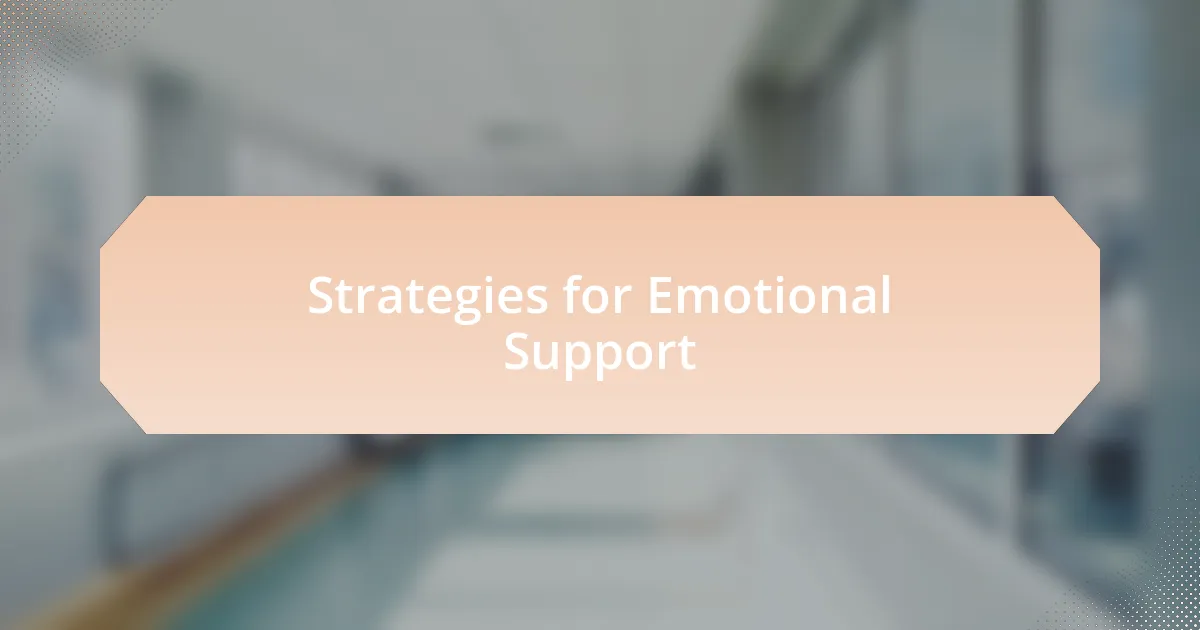
Strategies for Emotional Support
One effective strategy I’ve discovered for emotional support involves setting up peer support groups. During my visits, I was touched by a group of emergency medical technicians who gathered weekly to discuss their experiences. They didn’t just share stories; they created a safe space where vulnerability was not only welcomed but celebrated. This camaraderie helped each member realize they were not alone in their struggles. Have you ever been part of a supportive community? It can be incredibly comforting to know others understand your journey.
Another practical approach is offering mindfulness and stress-relief workshops. I recall attending a session led by a clinical psychologist designed specifically for first responders. The techniques they learned for grounding themselves were not only immediately applicable on the job but also served as lifelong tools. I was amazed at how a simple breathing exercise transformed their perspective on stressful events. How often do we overlook the power of our breath in managing emotions?
Creating resource hubs with accessible mental health materials also proves beneficial. I once witnessed the positive impact of a well-organized library of self-help books and online resources at a station. First responders could explore various topics—from coping mechanisms to team dynamics—at their own pace. This easy access to information empowers them to take charge of their mental health. Isn’t it interesting how the right resources can spark someone’s motivation to seek help?
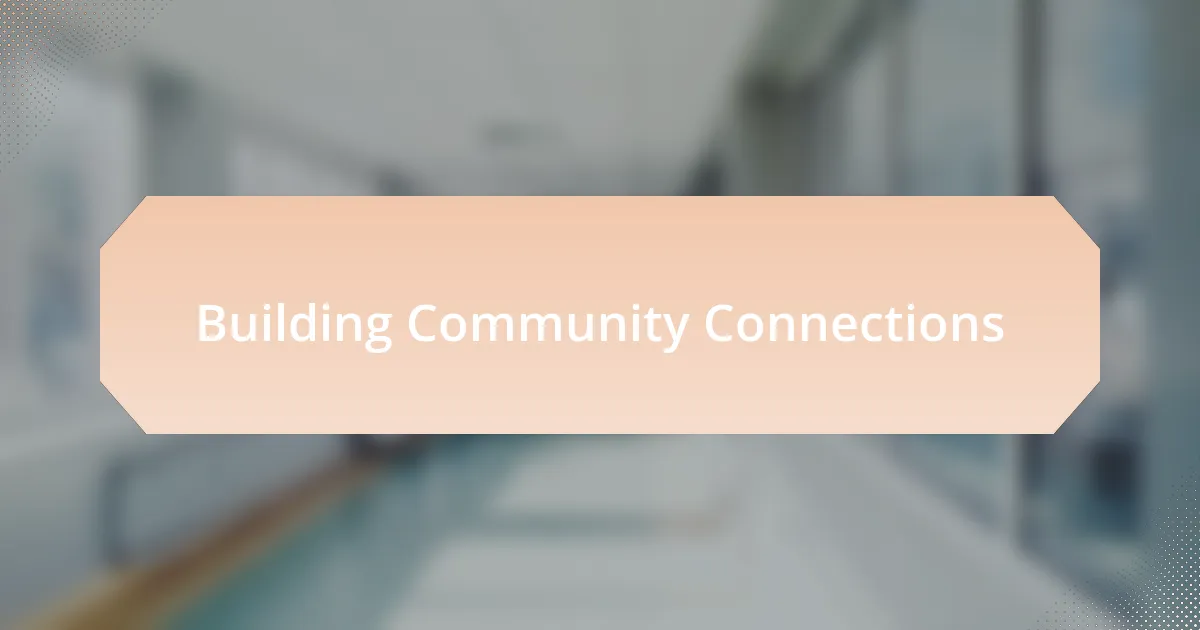
Building Community Connections
Building community connections among first responders is vital for nurturing their resilience. I recall a local fire department organizing a family day, bringing together not just the responders but their families and friends as well. That day, I witnessed bonds being forged over barbecues and laughter, highlighting the importance of a supportive network beyond the job.
Additionally, I’ve seen firsthand how social events, such as game nights or team outings, can strengthen relationships in high-pressure environments. One evening, I participated in a trivia night with paramedics, and it was refreshing to see them relax and enjoy themselves outside of their uniforms. This wasn’t just about fun; it was about reinforcing trust and understanding, creating a foundation for better teamwork during tough times.
On a more personal note, I once facilitated a workshop where team members shared not just their challenges, but their motivations and dreams. By opening up about their personal journeys, they developed a deeper appreciation for each other. Isn’t it fascinating how vulnerability can be a bridge to stronger community ties? In my experience, when we share our stories, we build a connection that helps us weather any storm together.